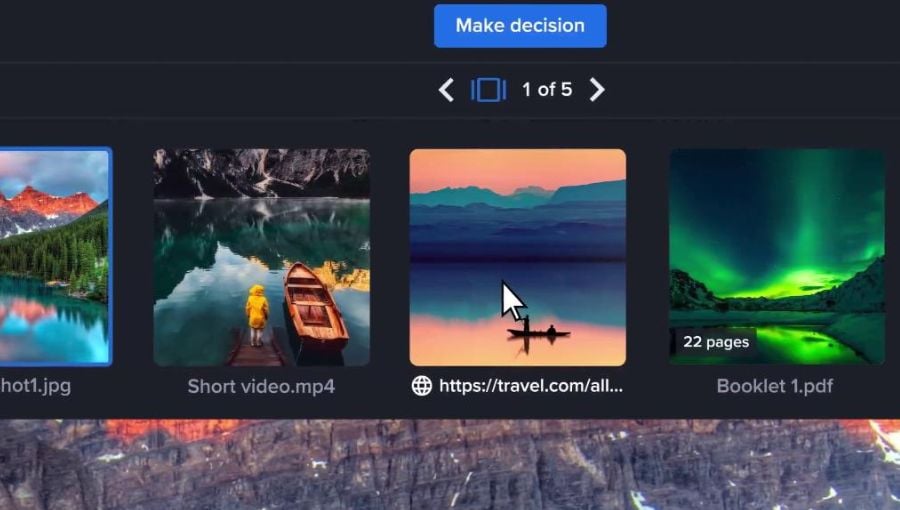With the explosion of available channels and fast-paced nature of campaigns, busy teams are are asked to produce a much more marketing collateral than ever before. The endless flow of marketing materials are needed to maintain engagement with a brand or product's target audience. But with so many different types of promotional materials and strategies to choose from, it can be tough to know where to begin.
In this comprehensive guide, we'll explore the ins and outs of marketing collateral, from its definition to the different types of materials you can use to promote your brand. We'll dive deep into the world of sales and advertising materials, sharing best practices for creating assets that resonates with your audience and aligns with your brand identity.
Whether you're focused on generating leads, nurturing prospects, or closing sales, we've categorized our marketing collateral examples into funnel stages to help you achieve your different business goals.
What is marketing collateral?
Before we go any further, let's define marketing collateral to make sure we're all on the same page. It simply refers to any material used by businesses to showcase their products or services, ultimately driving sales and fostering brand recognition. Essentially is can be any marketing asset that faces the public.
Key considerations for creatives when designing marketing collateral
Before you create your marketing collateral, you’ll need the following information:
Brand guidelines
If you’re creating marketing collateral for a client, you’ll need a solid understanding of their brand guidelines — colors, tone, logo, fonts, and value proposition, for example. (Even when clients say they don’t have brand guidelines, they probably at least have preferences).
Distribution channels
Wouldn’t it be great if Facebook, LinkedIn, and your website all had the same content formatting parameters? Unfortunately, each distribution channel/social media platform operates by its own rules, so you’ll need to know where your marketing collateral will appear. You may need to make a few versions of a file, edit text to fit a character limit, or change the resolution of images.
Target audience
Who’s the target audience for the marketing collateral you’re creating? Existing customers? Prospective customers? Former customers you’re hoping to bring back? If you want your marketing collateral to resonate with people, you need to know who you’re trying to reach.
Funnel stage
In addition to knowing who your target audience is, you’ll need to know where they are in the customer journey, or “marketing funnel.”
The marketing funnel is an easy way to segment customers by awareness. In some industries and agencies, the funnel might contain several levels, but generally, you can create marketing collateral based on these primary levels:
Awareness — (top of the funnel, or “TOFU”)
At this stage, potential customers know that they need to solve a problem or fulfill a need. They’re just starting their search for a solution. They might be Googling key terms, asking colleagues for recommendations, or reading articles in trade publications.
Consideration — (middle of the funnel, or “MOFU”)
People in this stage have begun to zero in on a solution. Instead of searching for “How do I manage creative assets?” they may be researching specific solutions such as "creative collaboration software.”
Decision — (bottom of the funnel, or “BOFU”)
BOFU prospects are typically weighing their options. At this stage, they're looking for exact differentiators by Googling specific brands or providers or comparing product features and pricing pages.
28 types of marketing collateral (by funnel stage)
As promised, here are 29 types of marketing collateral — in alphabetical order — you can use to connect with consumers throughout the marketing funnel:
Brochures
Best for: TOFU
Historically, companies distributed print brochures to prospective clients when they met in person or through the mail.
Today, while brochures may still have a “front” and “back,” they’re usually digital (which means no printing costs!). Brochures contain information about a company’s products or services, along with contact information.
For example, here’s a brochure from the Nature Conservancy:
Business cards
Best for: TOFU
Business cards are the tried-and-true way to introduce yourself and your business to potential customers.
You never know when you’re going to meet someone in person. Whether you’re at a conference, seminar, or convention, it’s useful to have a business card to hand out.
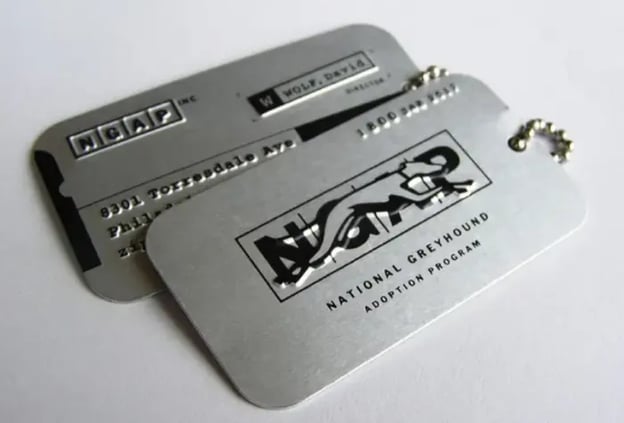
Remember that business cards don’t have to be made of paper, as shown in this example.
Buyer guides/spec sheets
Best for: BOFU
It’s common for decision-makers to have last-minute doubts about a purchase, especially if there’s a large sum of money at stake. You can use buyer guides to entice prospects with contextual marketing so that they don’t drop out of the funnel.
Cart abandonment emails
Best for: BOFU
E-commerce stores use cart abandonment emails to remind users that they added items to their shopping cart but haven’t checked out yet. In most cases, the emails contain an incentive to complete the purchase, like a discount coupon.
It’s estimated that 67% of sales are lost due to abandoned carts. But the good news is that you can recover up to 12% by sending abandoned cart emails.
Case studies
Best for: MOFU, BOFU
Case studies are the best example of marketing collateral for the consideration stage as they showcase your brand’s success stories.
The objective of a case study is to demonstrate how clients achieved success with your product or service. They usually include four main components: the challenge, the solution, the result, and the client’s testimonial.
Before you write the case study, it’s essential to interview the client and get their story. You want to share first-hand how they used your product to overcome their challenge.
Like most marketing collateral, case studies are educational and help build credibility and trust.
Ebooks
Best for: TOFU
You can use eBooks to educate and inform your audience, particularly if you want to position yourself as an expert on specific topics.
Your brand can use an eBook to explain your value, build a relationship, and establish credibility with your audience. You can also use an eBook to capture leads, by requiring an email address to download the content.
Event displays
Best for: TOFU
Event displays are an alternative way to distribute your marketing collateral. You can use an event booth to provide potential customers with information about your products and services in the form of brochures, flyers, or free samples. And don’t forget an eye-catching banner that people can see from a distance.
Explainer videos
Best for TOFU, MOFU
Explainer videos are usually short, animated pieces that explain a feature (or features) of your product or service. Visual learners may prefer this format over text.
Flyers
Best for: TOFU
Unlike brochures, flyers typically consist of one A5-sized sheet rather than a foldable (or digital) pamphlet. Flyer content needs to be engaging and well-designed to capture prospects' attention.
Flyers are effective for outdoor marketing, because you can distribute them quickly to many people.
Infographics
Best for: TOFU
Like blog content, infographics are another form of marketing collateral you can use throughout the buyer’s journey, but usually are most effective at the awareness stage. An infographic might include an illustration, graph, chart, or a combination of those elements. They can standalone pieces or part of an article or blog post.
Infographics remain popular as they are a powerful way to present information, particularly statistics and data. Plus, other sites often reference and link to them, so they can help generate website traffic.
Landing pages
Best for: TOFU, MOFU
If your goal is to capture leads (that you can convert into new customers), a paid search ad that leads to a landing page is the way to go.
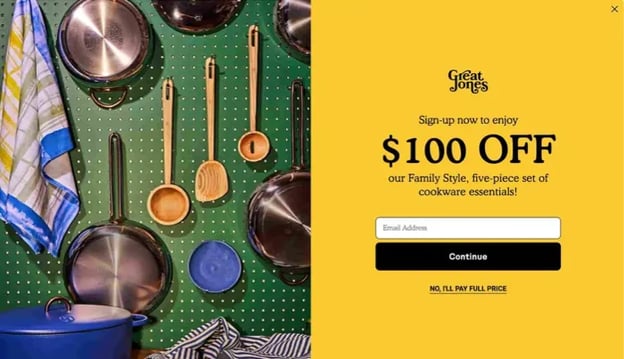
As shown in this example, a landing page should include minimal text and a clear call to action. Landing pages are good for A/B testing CTAs to see which type of language motivates people to subscribe.
Long-form blog content
Best for: Any stage
You can use long-form blog content at any stage of the funnel, but it’s perfect for the awareness stage. You can help buyers on their quest for a solution by writing posts that address the problems they face.
Because blog content acts as a hub for answering questions that people are searching for, it effectively drives traffic to your website and, at the same time, helps your company build brand awareness. Blog posts also help position you as an expert.
Pro Tip: Include visuals in your blog posts to keep your readers engaged.
Newsletters
Best for: BOFU
Anyone who subscribes to your newsletter is interested in your product or is already a customer. Newsletters can help you foster customer loyalty, introduce new products, and encourage repeat business.
Podcasts
Best for: TOFU
A podcast can be effective for positioning your brand as a thought leader. While it may not be suitable for, say, a manufacturer, it’s ideal for companies that have a lot of insider tips to share — health and fitness brands, for example.
Portfolio pages
Best for: MOFU
Your portfolio is a great way to showcase your creative projects. It provides proof that you’re doing your job well and that your work is appreciated. It’s also a useful tool for employer branding and attracting other partners, as they can see what you’re doing at a glance.
POS displays
Best for: Any
Traditionally, point-of-sale displays are located in retail stores near the checkout. But you can also create online equivalents that nudge people to make a purchase and place items in their shopping cart.
Press releases
Best for: TOFU
Press releases include news about the most significant successes of your company, like awards and recognition. You can publish them on your website and also print them out to hand directly to prospects.
Distribute press releases to news organizations to help expand your reach.
Product comparison pages
Best for: BOFU
Buyers that are carefully considering their options may be comparing products and services. It’s in your best interest to create one or more product comparison pages on your site so that you have control over the content.
Yes, you’ll need to be objective, but at least your product info will be correct.
For example, here’s a product comparison page for Ziflow and Frame.io.
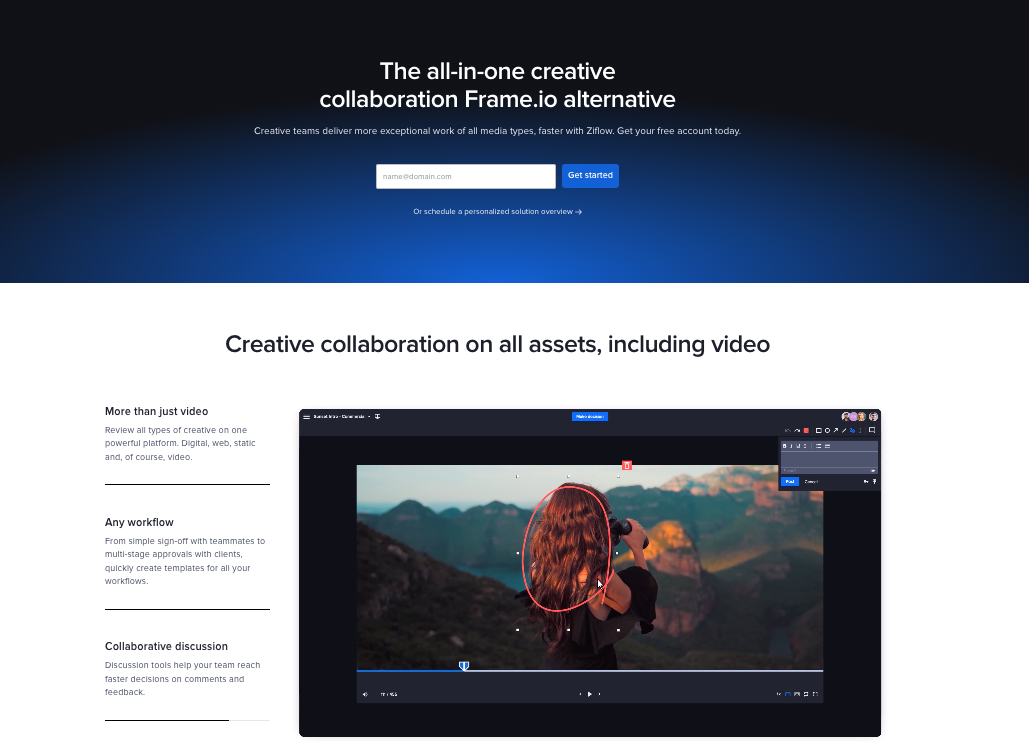
Product pages
Best for: BOFU
Product pages are the online equivalent of printed product catalogs. They describe the features and benefits of your products or services in as much detail as is necessary. Typically, they use both text and visual elements to convey product features.
Promotional products
Best for: TOFU
Who doesn’t love a free can koozie, stress ball, or notepad? Applying your branding to these inexpensive products and giving them away at conventions is an easy way to stay top-of-mind with prospective customers.
Proposals
Best for: BOFU
Proposals are confidential documents for B2B clients that include terms, conditions, and pricing.
Business proposals and presentations may be in PowerPoint or PDF formats. When creating a proposal, tailor it to the preference of the audience. For example, if you know a CFO who’s short on time will be viewing the presentation, keep it brief, and use plenty of visuals to convey information.
Retargeting ads
Best for: BOFU
You can use retargeting ads to re-engage people who have visited specific pages on your site. For example, you could offer a special discount to people who visited a product or service page but left without converting.
Slide decks
Best for: BOFU
Slide decks have applications beyond sales presentationsPotential customers that want to know more about your product or service but aren’t quite ready to ask for a quote or have a conversation with you may appreciate a self-serve slide deck.
This interactive presentation deck from Carlton Hotels allows audiences to flip through pages and check out features in their own time.
Solution/industry pages
Best for: MOFU, BOFU
If your product or service covers multiple industries, then you should address each industry or solution type with a vertical page dedicated to each audience.
Choose the primary industries you work with, create some use cases related for each vertical, and then upload the information on your website.
For example, Ziflow has solutions pages for multiple sectors, including creative & digital agencies, marketing teams, and more.
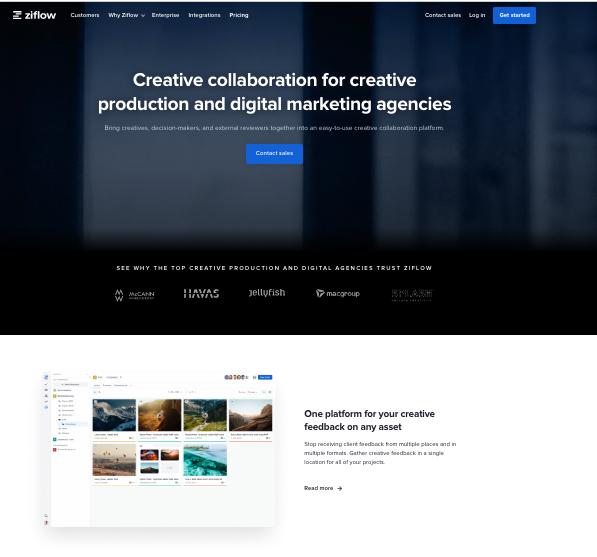
Sponsored content
Best for: TOFU
Sponsored content is specifically for news publications. Companies may provide images for the sponsored content, but usually media publications will create it (for a fee) to ensure it aligns with their branding.
Testimonials
Best for: BOFU
Genuine customer testimonials and reviews prove that your products or services are what prospects need. In a way, they act like condensed case studies. While not all buyers have time to read a case study, they can see at a glance that you have satisfied customers.
Ensure your testimonials are visually engaging and state clearly who provided the quote – a headshot with the company position works well. Then, in the quote, reference a specific benefit.
You could take it one step further with video testimonials, depending on your distribution channels.
Text campaigns
Best for: MOFU, BOFU
Media-rich text messages can be a great way to share special offers.
In this example, Sonic includes hyperlinks for discount offers, as well as an image of its newest product.
White papers
Best for: MOFU
White papers are authoritative, in-depth pieces covering a technical subject. And typically, they introduce a problem and provide a solution to it. You can use them to establish yourself as an expert in a particular field.
White papers should be thoroughly researched, professionally formatted, and written in a more businesslike tone than an eBook. However, that doesn’t mean they can’t be colorful and engaging. Take a look at this white paper excerpt from Vennage:
What will you create?
And that concludes our list of 29 types of marketing collateral! What will you create for your next marketing campaign?
Creative resources are not unlimited, and creative teams much choose wisely in the types of marketing collateral they spend their time and design effort on creating. Knowing how to choose the most effective form of collateral for each stage of the buyer's journey ultimately your creative team helps determine which collateral should be prioritized in the creative production process. These 28 types offer various outcomes and can be combined to produce maximum results from creative work.
